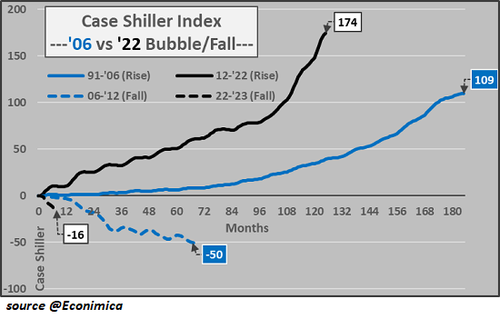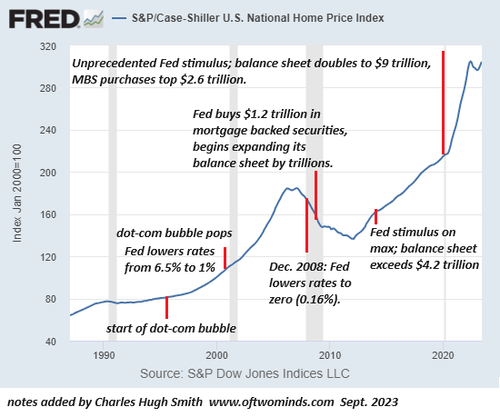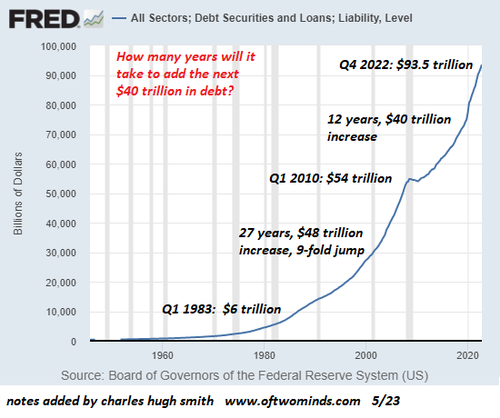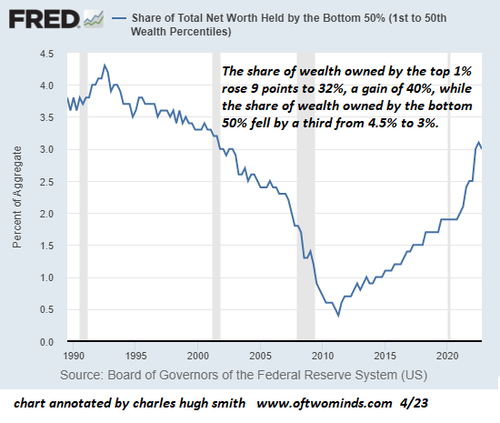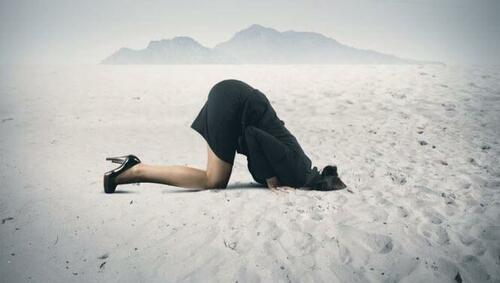
Authored by Charles Hugh Smith via OfTwoMinds blog,
We'd rather risk societal collapse than face the sacrifices and challenges of revolutionizing our unsustainably neofeudal economy and broken gears of governance.
Denial is scale-invariant and universal--we've all experienced in some way or another. By scale-invariant, we mean the individual, household, enterprise, city, state and empire all experience denial.
Denial has several signature characteristics:
1. The more profound and consequential the issue, the more stubborn our denial. When a minor cut reddens, we don't go into denial that it's infected, we simply treat it with greater care. But when the unmistakable signs of heart disease appear, we find ways to deny the reality because it's too upsetting and frightening. We want very desperately to think it will go away on its own and we'll be fine, and nothing in our life will change.
2. The strength of our denial flows from the tacit understanding that if we let even a tiny bit of doubt break through our dam of denial, the whole foundation will give way. The power of denial originates in the impermeability of the barrier blocking warning signs that all is not well. If the enterprise, relationship, policy, investment, etc. is no longer sustainable or viable, we must shut out all doubt and evidence because even a rivulet of doubt and evidence will quickly erode the dam of our denial and collapse our sense of security, control and predictability.
And so we hold fast to the idea that these chest pains are merely indigestion, and inflation is already receding. We fiddle with data ("ex-food, fuel, used cars, shelter, healthcare, childcare, hospitality and dining out, inflation is trending down!") to conjure up an alternative reality in which everything is fine, under control, progress and growth are still positive and unstoppable, and so on.
When challenged, we become defensive and angry, as if our security and identity are under attack. Since we've tied our identity and security to fixed, rigid standards, should those standards erode and decay, we deny the erosion because we feel our own security, identity and sense of control are giving way and might collapse. To avert this disaster, we shore up our dam of denial, making sure no shred of doubt or evidence gets through to threaten us.
This strategy is terribly misguided, of course, because denying reality doesn't make the threat go away, it magnifies the risk of collapse. Denial can be summarized as the stubborn inability to tell the truth because our fear of losing control as the foundations of our life crumble beneath us is so great that we're compelled to cling to denial and fantasy: debt doesn't matter, the government can print as much money as it needs, we'll just renovate all those empty office towers into housing, and so on.
Reality is only a threat if we've forsaken flexibility, adaptability, problem-solving, and the willingness to make sacrifices and accept failure--what I call Self-Reliance. The appeal of denial is uniquely powerful because it offers us a means to cling to our security, identity and sense of control without having to actually do anything.
Just as we'd rather risk expiring from a heart attack than face the sacrifices and challenges of revolutionizing our diet and fitness, we'd rather risk societal collapse than face the sacrifices and challenges of revolutionizing our unsustainably neofeudal economy and broken gears of governance.
And so all those who've benefited from the Bubble Economy look down on the decaying city center from their comfortable, smartly-appreciating homes and cling to the absurd fantasy that the rot won't reach them--indeed, the rot can't possibly reach us, it will stay safely far away and we'll be safe here in our enclave.
This is remarkably reminiscent of the wealthy Romans just before the collapse, complaining to each other in correspondence about the annoyances of decay seeping into their comfortable estates. They too reassured themselves that Rome was eternal, everything would right itself without any sacrifice on their part.
Their correspondence ended abruptly when the Imperial courier service ceased to function. The "Barbarians" (i.e. non-Italian residents of the Empire) who assumed power did not have the wherewithal to gather the taxes needed to support the immense Imperial infrastructure that made life comfortable for the landed wealthy, and so it went away.
So no worries, our neofeudal system, broken governance and all, is eternal and will fix itself without any sacrifices on our part. Maybe those chest pains are just indigestion. Let's just ignore them, they'll probably go away on their own.
Alternatively, we can relinquish fantasies and fear and accept that it's adapt or expire and we'll have to handle the adapting ourselves. This is the path of Self-Reliance, and if we're willing to take it, the path is wide open.
* * *
My new book is now available at a 10% discount ($8.95 ebook, $18 print): Self-Reliance in the 21st Century. Read the first chapter for free (PDF)
Authored by Charles Hugh Smith via OfTwoMinds blog,
We’d rather risk societal collapse than face the sacrifices and challenges of revolutionizing our unsustainably neofeudal economy and broken gears of governance.
Denial is scale-invariant and universal–we’ve all experienced in some way or another. By scale-invariant, we mean the individual, household, enterprise, city, state and empire all experience denial.
Denial has several signature characteristics:
1. The more profound and consequential the issue, the more stubborn our denial. When a minor cut reddens, we don’t go into denial that it’s infected, we simply treat it with greater care. But when the unmistakable signs of heart disease appear, we find ways to deny the reality because it’s too upsetting and frightening. We want very desperately to think it will go away on its own and we’ll be fine, and nothing in our life will change.
2. The strength of our denial flows from the tacit understanding that if we let even a tiny bit of doubt break through our dam of denial, the whole foundation will give way. The power of denial originates in the impermeability of the barrier blocking warning signs that all is not well. If the enterprise, relationship, policy, investment, etc. is no longer sustainable or viable, we must shut out all doubt and evidence because even a rivulet of doubt and evidence will quickly erode the dam of our denial and collapse our sense of security, control and predictability.
And so we hold fast to the idea that these chest pains are merely indigestion, and inflation is already receding. We fiddle with data (“ex-food, fuel, used cars, shelter, healthcare, childcare, hospitality and dining out, inflation is trending down!”) to conjure up an alternative reality in which everything is fine, under control, progress and growth are still positive and unstoppable, and so on.
When challenged, we become defensive and angry, as if our security and identity are under attack. Since we’ve tied our identity and security to fixed, rigid standards, should those standards erode and decay, we deny the erosion because we feel our own security, identity and sense of control are giving way and might collapse. To avert this disaster, we shore up our dam of denial, making sure no shred of doubt or evidence gets through to threaten us.
This strategy is terribly misguided, of course, because denying reality doesn’t make the threat go away, it magnifies the risk of collapse. Denial can be summarized as the stubborn inability to tell the truth because our fear of losing control as the foundations of our life crumble beneath us is so great that we’re compelled to cling to denial and fantasy: debt doesn’t matter, the government can print as much money as it needs, we’ll just renovate all those empty office towers into housing, and so on.
Reality is only a threat if we’ve forsaken flexibility, adaptability, problem-solving, and the willingness to make sacrifices and accept failure–what I call Self-Reliance. The appeal of denial is uniquely powerful because it offers us a means to cling to our security, identity and sense of control without having to actually do anything.
Just as we’d rather risk expiring from a heart attack than face the sacrifices and challenges of revolutionizing our diet and fitness, we’d rather risk societal collapse than face the sacrifices and challenges of revolutionizing our unsustainably neofeudal economy and broken gears of governance.
And so all those who’ve benefited from the Bubble Economy look down on the decaying city center from their comfortable, smartly-appreciating homes and cling to the absurd fantasy that the rot won’t reach them–indeed, the rot can’t possibly reach us, it will stay safely far away and we’ll be safe here in our enclave.
This is remarkably reminiscent of the wealthy Romans just before the collapse, complaining to each other in correspondence about the annoyances of decay seeping into their comfortable estates. They too reassured themselves that Rome was eternal, everything would right itself without any sacrifice on their part.
Their correspondence ended abruptly when the Imperial courier service ceased to function. The “Barbarians” (i.e. non-Italian residents of the Empire) who assumed power did not have the wherewithal to gather the taxes needed to support the immense Imperial infrastructure that made life comfortable for the landed wealthy, and so it went away.
So no worries, our neofeudal system, broken governance and all, is eternal and will fix itself without any sacrifices on our part. Maybe those chest pains are just indigestion. Let’s just ignore them, they’ll probably go away on their own.
Alternatively, we can relinquish fantasies and fear and accept that it’s adapt or expire and we’ll have to handle the adapting ourselves. This is the path of Self-Reliance, and if we’re willing to take it, the path is wide open.
* * *
My new book is now available at a 10% discount ($8.95 ebook, $18 print): Self-Reliance in the 21st Century. Read the first chapter for free (PDF)
Loading…
